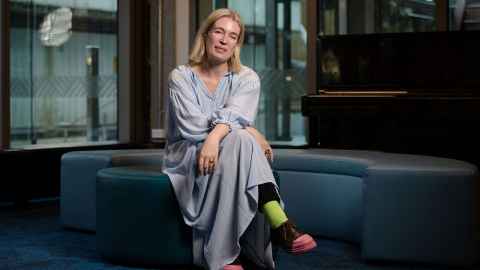Sarah Foster-Sproull: dancing out of the spotlight
30 November 2023
Dance lecturer Sarah Foster-Sproull found a creative way to overcome stage fright – she became a leading choreographer, allowing other dance performers to take centre stage.

In the world of dance, where grace and poise often steal the spotlight, one would seldom expect a seasoned dancer to suffer from performance anxiety.
But for Sarah Foster-Sproull, stage jitters have always been part of her story.
Despite her magnetic connection to dancing, Sarah found herself ensnared by performance anxiety from a young age.
“I would coil myself up. I had anxiety about dancing in front of people because I wanted to do right by the dance and the music and represent my family,” she says.
It’s been a decade since Sarah last graced the stage, but in that time she has carved out a reputation as one of the country’s top choreographers. On top of working as a senior lecturer in Dance Studies in the Faculty of Creative Arts and Industries, she is the choreographer in residence at the Royal New Zealand Ballet and the artistic director of her own company, Foster Group.
Her passion for the art form and her commitment to the people closest to her are two powerful driving forces in her life.
“I only ever really work with my friends. I don’t choose to work with people I don’t know. I don’t hold auditions. I’m not interested in anything more than asking, ‘Do you have a talent for what you’re doing, a curiosity, an intense rigour and the ability to crack a gag in the studio?’ I gravitate towards people who have those traits.”
In August, she unveiled her latest stage production, Double Goer, which made its debut at the Edinburgh Fringe Festival. Joining her were two of her closest friends, doctoral candidate Rose Philpott, and Tamsyn Russell, who took the lead as the show’s captivating performers.
The intense 50-minute dance work, which received excellent reviews, featured two women battling for supremacy through acts of competition, agility, strength and stamina in a terrain of haphazard sculptures.
Sarah’s artistic path has been profoundly influenced by the community of creative women she works with. She has strived to represent the voices and experiences of women through her choreography for as long as she’s been doing it.
Double Goer delves into women’s relationships with each other and the complex dynamics of sisterly relationships, embracing the emotions that encompass these bonds, from competition to familiarity, and from tension to comedy.
“It runs the whole gamut of emotions in an hour. Rose, Tamsyn and I made this work over three years, so all of the things that are bound into the work are also bound into our lives.”
I’m not interested in anything more than asking, ‘Do you have a talent for what you’re doing, a curiosity, an intense rigour and the ability to crack a gag in the studio?’ I gravitate towards people who have those traits.”
Sarah’s career in dance began in Dunedin at a young age after being inspired by a close friend’s involvement in ballet. She fell in love with the art form’s connection to music and, at 17, left for Wellington and trained at the New Zealand School of Dance.
“I went as a ballet major. That’s what I thought I was going to do with my life. Then I met a bunch of lecturers who showed me different ways of moving, which really made sense to my body. So, in my third year, I made a natural shift away from ballet and into contemporary dance.”
After completing her studies, she headed for the UK, where she spent four years “pulling a career together”. She juggled a variety of roles, including working for dance companies, performing in BBC radio dramas and even playing a small part as a zombie in the 2007 horror film 28 Weeks Later.
“The biggest thing for me was being away from New Zealand and soaking in everything that London has to offer. I always advocate for university graduates to travel because it changed me forever.”
Upon her return to New Zealand, she had two children, now 13 and seven, and achieved her dream of working with Kiwi dance icons Douglas Wright and Michael Parmenter.

Her transition to academia was influenced by her close friends and her own desire to explore the ethics of choreographic practice. Her recently awarded PhD explores the mechanisms and ideas that drive creative practices.
Meanwhile, she continues to explore the endless possibilities of movement and creativity. In October, she spent time at the New York Choreographic Institute, where she crafted a work with dancers from the New York City Ballet.
She misses dancing “tremendously” and next year has plans to make her return to the stage.
However, there’s still one hurdle to overcome: performance anxiety.
“I never actually dealt with it,” she says. “I can feel the nerves already.”
Yet, much has changed since her last performance, including her perspective on stage fright. “I’m a lot older now and wasn’t previously aware of the complexity of my performance anxiety.
“I’m now more willing to address it in a way that demonstrates to my daughter that you can do whatever you want, in whatever way you want to. It doesn’t matter.
“Just do things you really care about.”
Story by Hussein Moses

This story first appeared in UniNews December 2023.